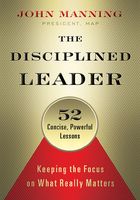

Be Truthful
This book would not be complete without a lesson on truthfulness. Telling the truth is more than just a key aspect to good leadership. It is the best way to live your life. Our level of integrity defines who we are at our core. Truthfulness is the golden thread that binds good lives, good relationships, and our very legacy. Over the course of my career, I have conducted hundreds of job interviews, and most candidates tell me one of their values is integrity. Why? Because being an honest person who speaks and acts truthfully is so integral to living a good life, maintaining wonderful relationships, and establishing that great legacy.
The Disciplined Leader consistently tells the truth. Of course, being truthful is always easier when you are talking about the good stuff at work. Obviously, it’s much more challenging when you’re talking about what’s gone wrong or giving bad news. The longer I live and participate in the business world, the more I realize telling the truth is almost always the correct choice, painful or not. There are ways to communicate with tact; a harsh reality can be delivered in a constructive way.
Why, then, do some leaders sugarcoat or downright lie about the state of business or how their employees are performing? Fear. And sometimes ignorance. They’re afraid they’re going to come across as weak, and they often simply don’t understand or know how to “speak the truth” to staff or employees.
At times, you may also feel conflicted about delivering honest, albeit challenging communications with those you manage. But put yourself in your employees’ shoes. They can’t achieve their goals unless they have an idea of how they’re truly performing and how they can take corrective action to improve their performance. So whether you’re being honest about individual performance or the company’s health, letting people know where they stand and being frank about the facts is the best approach. The truth will set the stage for a candid workplace culture, which is a pillar to an accountable, productive workforce.
Assess your overall life with truthfulness as the standard. Do you consistently tell the truth to your family, friends, and co-workers even if it is uncomfortable or unpopular? If you uncover areas where you need to make improvement, make a commitment to the needed changes. These changes will align with your desire to become a truly great leader who inspires others to grow and succeed.
Here are three applications for being truthful:
Be honest with yourself. As you contemplate the future you that you’re exploring through this part of the book, don’t leave truthfulness behind. It’s your foundation, who you truly are, and a way for detecting what you need to change. If you can’t take an honest look at yourself and who you are today, you won’t be able to move forward. You need that benchmark or reference point for setting goals, measuring progress, and creating accountability. If you’re not truthful with yourself, you’ll most likely be incapable of being honest with others. This inability to be truthful impacts so many aspects in life, making it less fruitful.
Make truthfulness your mantra. We all struggle with the truth at times. Bend the truth in your mind, and it becomes impossible to be candid with yourself, other people, and all the situations you face in your environment. However, when you make truthfulness your mantra, it’s much easier to be honest about whatever comes your way. When you have those tough calls to make or need to communicate something important, stay grounded in truth.
Use truth to act fast. In essence, truthfulness is a change accelerator—one that always starts with you. Operating from that space within, you can then make decisions and choices that will reflect your inner wisdom, self-discipline, and integrity. You’ll also become equally empowered to prohibit negative self-talk that might rationalize your thoughts away from cold, hard truths. You’ll be able to spot and stop the habit of making excuses, particularly the kind that have tried to knock you off the path of integrity.
In Summary: The Disciplined Leader makes integrity a guiding principle to define his or her leadership and build its legacy. Truthfulness is one of the most important virtues of human behavior. Understand that the truth itself cannot hurt you; it is what you do with the truth that can do harm if handled badly.
Take Action!
 Make sure your core values include something around integrity or truth.
Make sure your core values include something around integrity or truth.
 Recognize situations or people where you struggle to be candid. Recognize internal inhibitors that undermine your truthful ways, including rationalizing, making excuses, and pushing blame.
Recognize situations or people where you struggle to be candid. Recognize internal inhibitors that undermine your truthful ways, including rationalizing, making excuses, and pushing blame.
 Practice the principle of communicating with candor in all personal and professional relationships.
Practice the principle of communicating with candor in all personal and professional relationships.